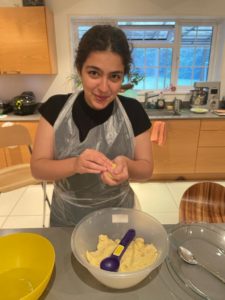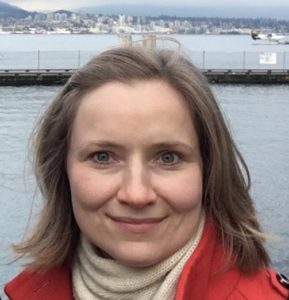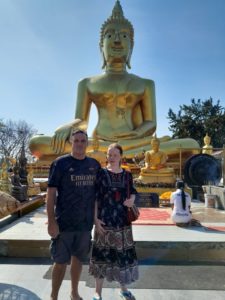For this year's International Women's Day celebrations, we share three stories of women in STEM, exploring their career paths, interests, motivations, the value of role models, decisions they are most proud of and what advice would they want to share with fellow students or academics.
Inés Blanco Rivas

I’m Inés, a final year Computer Science and Mathematics student, who is currently the Vice Chair of the Women in Technology group at the university.
If I am completely honest, I am not sure when I decided to go into STEM. I have always loved science, particularly numbers, logic, and problem solving. So I always knew I wanted to do a math-oriented degree. Fortunately, at home, I never had a problem with that. I was very lucky to be raised in a household where not only was there no prejudice towards women going into STEM, but I had my mother as a role-model in the field. Whenever I heard a comment stating that women could not do science, or were worse at math than men, I would chuckle thinking of her.
Although I was lucky at home, society persists at making the point that STEM in general, and technology in particular, are made for men. From having to give a feminist speech in the middle of a mathematics exam, to convincing a friend she can go to a programming competition she has been dreaming to participate on for years, these are things that would have never happened to a man.
If you are now deciding whether you want to get into STEM or not, let me debunk a myth for you: getting into STEM does not mean only working in a lab, or coding at a desk job. Going into STEM gives you the tools to solve real-world problems, and I don’t mean those in math class where someone buys hundreds of watermelons. STEM is much more than that. STEM changes our society on a daily basis, from reducing landfill waste through ecological fashion apps, to making urban spaces more accessible. STEM unlocks endless opportunities, and thrives in the hands of creative people.
One of the achievements I am most proud of is volunteering in projects to get more women engaged in the field of technology. I have helped bring up a community which inspires young women into solving problems affecting them through mobile applications or artificial intelligence. Seeing these solutions in action is one of the most enriching moments I have ever got to experience. Whenever I feel impostor syndrome kicking in because someone codes better than me, or understands a complex theorem faster than I do; I think of the team of ten-year-olds I helped during my first year of volunteering. Those four girls who were able to change recycling in their community through their determination, passion, and a lot of “figuring out what to do when you don’t understand something”.
I sometimes ask myself why I feel the need to spread the word about the world of STEM, especially to young women. I guess the answer to that is because I want every girl who wants to get a future in STEM to be able to chuckle when they get asked if as a woman they can do as well as a man.
Olga Isupova

I am Olga Isupova, I am a Lecturer in Artificial Intelligence at Department of Computer Science and I am also a deputy head of Artificial Intelligence and Machine Learning research group.
I got my first degree (Specialist equivalent to MSc) in Applied Mathematics from Lomonosov Moscow State University, Russia. I then worked for a couple of years in industry in Moscow as a consultant in machine learning and data mining. After that I moved to the UK and got a PhD in machine learning from University of Sheffield. I had a couple of postdoctoral research positions in University of Liverpool and University of Oxford before I joined University of Bath as a Lecturer.
I have always loved mathematics and whatever I did well at school - dancing, playing piano - I did thanks to my analytical thinking. Moreover, both my grandma and mum (actually grandparents and parents) were applied mathematicians, so I have never seen this as a boys only club.
It is an exciting moment in AI and ML. It is going into the real world which both provide a lot of challenges and opportunities. I had a very interesting project detecting elephants from space and currently I am working on the follow-up of this project. The initial project was a proof of concept, whereas now we are looking at a specific park whether they can use the satellite imagery as a monitoring tool instead of manual counting they do now.
The best thing in my role is freedom pursuing whatever research questions and projects I am interesting in. As I mentioned I have never had any ideas in my head that I can't do something only because I am a woman. Any role models and inspirations I had were not gender based either. But if I have to pick up a woman it would be Maria Skłodowska-Curie. I am fascinated by her achievements.
My research is in machine learning, i.e. we build systems that learn from data to perform a task rather than us manually instructing a machine how to do the task. In particular I am working on Bayesian machine learning where we deal with uncertainty about data and about decisions made by an algorithms and application of machine learning in conservation. I also teach Artificial Intelligence.
As I said, for me there was nothing unconventional about my career route. I actually followed my grandparents and parents in their fields, though making it more academical than they did. I was very lucky that I have never felt being any less of or taken advantage of because of my gender among colleagues. I actually enjoy working in male dominated companies.
I still feel very proud that I managed to enter Lomonosov Moscow State University, one of the best universities in Russia, being raised in a tiny town and taught at the most ordinary school. I feel very proud that after learning English as a second language at school, I got a PhD (in English) and now teach in English myself.
Hollie Baker

I'm Hollie Baker, a third-year PhD student working with Prof Nicolai Vorobjov in the Mathematical foundations group in the Department of Computer Science. I'm registered blind and from a young age my dad reiterated to me regularly that getting a good education is very important, and then supported me in doing so. I did my undergrad in Computer Science at Bath, then took a year-long work placement as part of my degree at Mayden (a local company) where I worked as a software developer. Afterwards, my supervisor Nicolai supported me in applying for a PhD, I was really lucky and got a funded place at Bath!
My research is on Cylindrical Algebraic Decomposition, an algorithm Algebraic Geometry with wide ranging applications from topology to motion planning. My focus is on adapting the algorithm so that its output has certain desirable properties, building on the work of Nicolai and his colleagues. As it's mathematics, there are always challenging problems to solve and new concepts to learn. I’m excited that I get to work with an expert in their field on their own research, which is awesome!
I was brought up by my dad from the age of 11, and ended up in a male-dominated field. Thus attitude, ability, and enthusiasm have always played a much more important role than gender in inspiring me. I think it's very important to have role models and mentors.
Taking my dad's advice and choosing to work hard at school and get into university is the decision that I’m most proud of.
I grew up in a single parent family, went to a state school in the south Wales valleys, and faced difficulties at school due to my visual impairment. I had to work hard, learn to stand up for myself and developed resilience and determination when I was young. These are important skills throughout your life.
I now train Brazilian Jiu Jitsu at a local club, it's great exercise, and really fun. You get to learn useful self-defence techniques, as well as play-fighting on the floor with your friends! BJJ is a traditionally male-dominated sport, but lately more and more women seem to be joining, which is great!
I believe learning how to advocate for yourself, and to stand up for yourself when you know that you are right is super important - it can be hard, especially when disagreeing with those in positions of authority, but it’s crucial to do so.
Respond